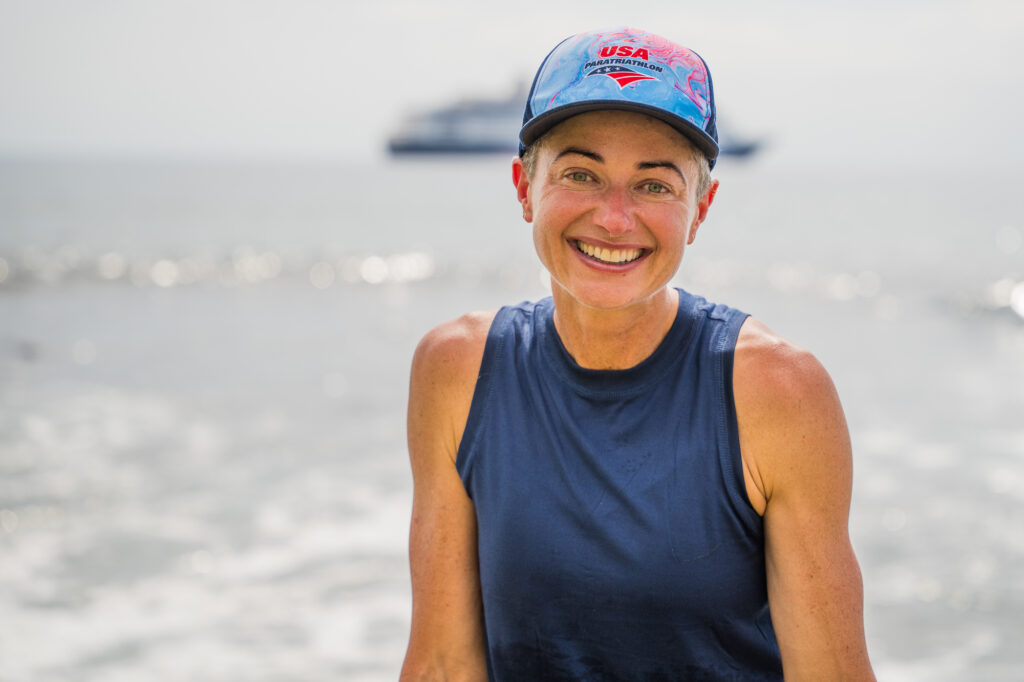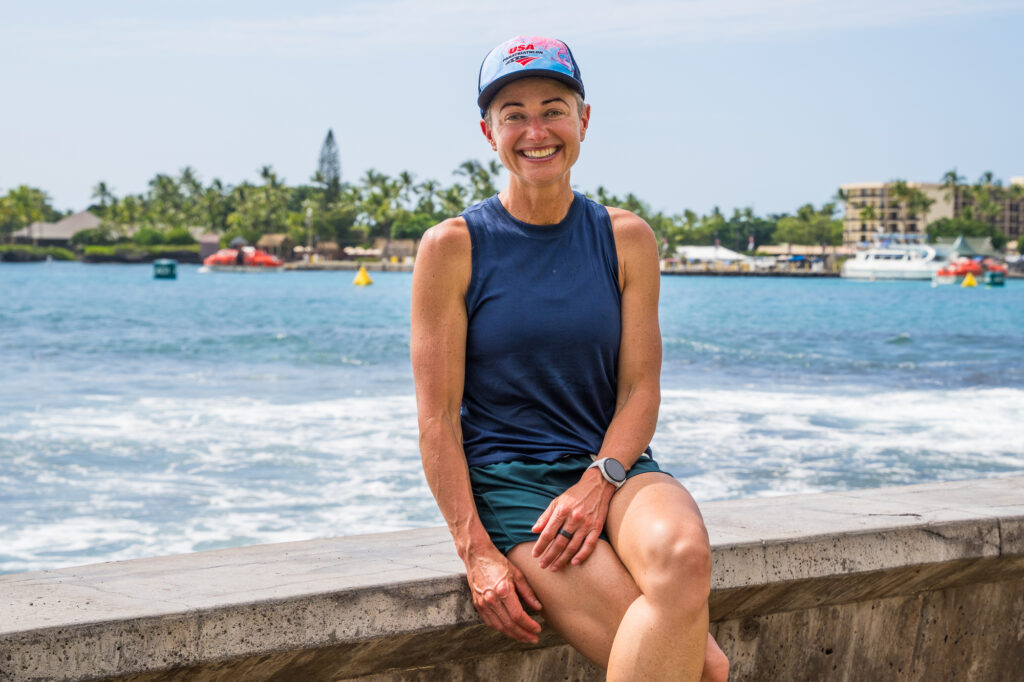Originally published at: USA Triathlon’s CEO, Victoria Brumfield, Looks To Realize a Dream in Kona - Slowtwitch News

Victoria Brumfield. Photos: Kevin Mackinnon
The first time I met Victoria Brumfield was at the one-and-done IRONMAN New York race in 2012. At the time Brumfield was the Executive Director of Korff Enterprises, the company that put on events like the New York City Triathlon and, that year, the full-distance race in New York that must have been a logistical nightmare. I got to watch Brumfield in action as she ran the pro meeting. At one point she blew through the directions on how the athletes could get to the ferry to get to the race start, and I laughed as I looked at all the pros faces as they tried to keep track of the 10 different streets and intersections she had described in roughly 15 seconds.
It was my first introduction to the positive energy that Brumfield exudes, which is why I was hardly surprised to see her named as USA Triathlon’s CEO a few years ago.
Tomorrow Brumfield will be taking on the IRONMAN World Championship in Kona for the first time, and I was keen to catch up with her to find out what motivated her to be here this weekend.
“Every time I tell someone I’m doing Kona I immediately jump in and say ‘I didn’t qualify – I’m doing it through the foundation,'” Brumfield laughs almost as soon as I turn on the recorder. “I feel this need to let everybody know I don’t deserve to be there.”
Brumfield is participating here in Kona as part of the IRONMAN Foundation’s ambassador program – all told the 30 women participating in the program will raise over $400,000, which will be put back into the community.
“Obviously, I also fundraise for USA Triathlon Foundation, but in this in this instance it’s for the IRONMAN Foundation,” she says. “I personally made a donation as well to them and, for me, it’s an immediate group of women that you’re connected to, and there’s an incredible community of support around it. I didn’t just fundraise my way as an individual. I’m doing it as a part of a group that’s super connected.”
For Brumfield, being here in Kona is a “full-circle” experience.
“(Racing here) is going to mean something really special,” she says. “I think what makes it special is this is the race that first introduced me to triathlon. Watching it on TV in high school and just wishing I was that kind of person. I just remember laying in bed thinking ‘I wish I was the kind of person who could do that. Who could wake up at 4 a.m.’ And now, I wish I was the kind of person who didn’t have to wake up at 4 a.m. I don’t know how that happened, but I think that it feels full circle, realizing something in myself that as a kid I didn’t think was possible.”
“I think the other thing is just personally, I’ve worked really, really hard to train for this,” she continues. “I’ve trained more intentionally for this than I have any other race … I don’t know if it’s wanting to feel like I belong, but it’s wanting to respect the best women in the world … and to what the race represents by not showing up and being flippant about it. But respecting them and also respecting the course and the elements.”
Competing here in Kona also has a special meaning because next year’s world championship returns to seeing both men and women competing on the same day here in Kona.
“For me it’s just been this evolution of ‘I’ve done IRONMAN and I’ve done a ton of racing and I love it, but this always just felt so unattainable,'” she says. “If there’s ever a year that I want to realize this dream, it’s the year that it’s all women. I love racing with women. All my first races – my first marathon, my first 10K, my first triathlon – were all women’s-only races. It’s funny because, looking back, I didn’t intentionally choose women’s only races … I think there’s just something different about the energy and the camaraderie.”

So has it been hard to balance training for the world championship while also heading up USA Triathlon?
“I’m a shell of a human,” she laughs. “It’s so hard. I’ve done full-distance races before, but I haven’t trained this with this much focus,. So when I first started training, it was just incrementally more and I thought ‘it’s not that bad.’ But the last six weeks of training, I mean, I was ramping up to 18 to 25 hours of training, with a couple of down weeks, on top of a very intense job that’s 50-plus hours a week, and travel. I think I probably didn’t show up as my best self at work every day because I was just drained all the time, especially once I started adding in sauna training.”
So what has she learned from the experience of training for the race on the Big Island tomorrow?
“Oh my God, I’m so good at eating,” she laughs. “Like a machine. What have I learned? Before I did my first full IRONMAN, I did Unbound Gravel, the 200-mile ride. It was the longest thing I’ve ever done. And a bunch of things went wrong, and it took me 18 hours. I just remember my first IRONMAN thinking ‘I’m going to finish this thing five hours faster than that bike race. I can do anything.’ I think what it made me realize is that no matter how good you feel, it’s not going to last. So, don’t overcook it. And, no matter how bad you feel, just keep moving. Cause it’s going to pass. It’s amazing, barring injury, what your body
can keep doing if you just keep moving. I feel like that’s translated into knowing that I actually can go slow for a long time.
As a high-profile person in the sport, I wonder if there’s something Brumfield hopes her participation in the race can do to help with the development of triathlon.
“Here’s what I care about in the sport: we want more women racing,” she says. “So, I think women recognizing that it’s not selfish, that they can participate in the sport and it’s for them. That’s number one. It doesn’t have to be this distance, but there’s always something to aspire to in the sport … Aspiring to something in the sport can mean doing two races a year, or going faster, or doing it with grace and dignity, or whatever it is. There’s always something to aspire to in a way that taps into potential and capacity that you never would have tapped into had you not challenged yourself in this sport. There’s something about it (triathlon). I love biking. I love running. Swimming’s okay. But there’s something different about this sport that you just can’t really access through just biking and running that triathlon helps you access. It’s the amount of commitment and determination and positivity that you have to maintain to overcome challenges, because there’s so many more variables and factors. And it doesn’t matter if you’re doing a sprint race or an IRONMAN. The sport has so many complexities to it, which creates barriers. That’s the tough part, but that’s also what makes you stronger and helps you realize more about yourself in a way that you can’t through just running or biking, in my experience.”
Does Brumfield see a connection between USA Triathlon’s goal of increasing participation and increasing the number of short-course races in the country and IRONMAN racing? For sure. She recalls the time in the sport when triathlon was about to become part of the Olympics.
“Short course racing is what it was all about,” she remembers. “The Bud Light series, and all the races that were televised that had big pro races were short course events. New York, LA, Chicago and St. Anthony’s – these were iconic short course races that people traveled around the country to go to. All my racing I did in the early 2000s was traveling to LA and Malibu and Chicago. Those were the races that
everybody knew about and they were televised and race directors were investing in television and
they were getting big non-endemic partners. It was a different time in the sport. I think we
can’t underestimate the value that IRONMAN brings. The fact that they’re investing in television
and pros and all of these things that give us the visibility that our sport needs. The challenge of that visibility is that it doesn’t come across as the most accessible of sports … There’s this perception that you have to be this extraordinary human as opposed to an ordinary human who can do extraordinary things. And the reality is that most of the extraordinary things we do start incrementally. So, we know that the vast majority of people who participate in triathlon are doing short course racing and that’s where we’re seeing the most growth in participation especially in female participation.”
For now, though, short course racing and getting more people to compete in the sport she loves needs to be put on hold for a bit. Victoria Brumfield has an IRONMAN to finish.